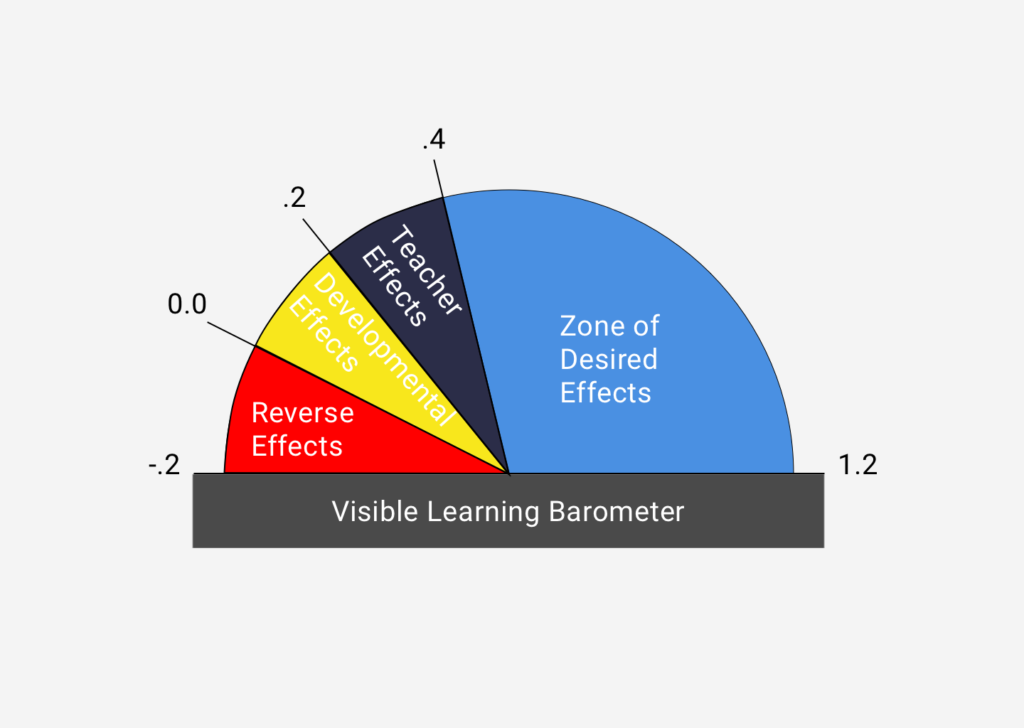Back in March, when Covid-19 closed down schools, most parents found themselves in the new and different position of becoming their child’s primary instructor. Between balancing changes in work schedules, a chaotic world outside, and social distancing, we also faced the particular challenge of teaching ratios and the three branches of government. As we juggle this downright odd and incredibly hard act, what strategies make the most sense for a parent to focus on during this time of lockdown?
This is an important question to ask in general. Even during normal times, our kids face large blocks of time outside of school. Summer break and holidays provide opportunities for learning in the home. And given the uncertainty of the 2020-2021 school year, we parents need a toolkit of learning strategies in our back pocket.
Effect Size: The Metric of What Works
A quick reminder that when studying what works in learning, the effect size is a measurement of the strength of the statistical claim. A larger effect size typically means we’re more confident that the variable we’re measuring affects a particular outcome. Effect size helps us answer the question: What factors should we (educators AND parents) focus on over others. Which strategies related to those factors have the more substantial payoff?

Anything above a 4.0 is considered a strong effect size.
Source: Hattie’s Visible Learning
First, an encouraging note. Parental involvement and positive family/home dynamics have a healthy effect size when it comes to students’ academic performance (.50 and .52, respectively). Simply being involved in our children’s learning and setting a foundation for healthy family/home dynamics is very important.
But beyond parental involvement, what influences can parents embrace during this time of corona? I’m going to jump into five that I think are relatively simple and don’t necessarily require a degree in education to accomplish.
Top Five Influences (Parent Version)
With a focus on that which is doable at home, here are the top 5 influences for parents.
Repeated Reading: 0.75
One of the best things a parent can do with their child is read. That means reading with them, to them, or having them read independently.
A particularly useful strategy in growing students is called repeated reading. At its most basic level, repeated reading involves having a child read the same text repeatedly until they master a degree of fluency. One way for parents to do this strategy is:
- Select a passage around 200 words or so.
- Pick a passage that hits the “goldilocks” level of difficulty. Not too hard and not too easy.
- Have the child read and read the passage until they read it correctly and at a standard rate.
Another simple strategy is to have the reading passage read to the student. Then have them practice reading it out loud.
Many education technology tools help with repeated reading. A personal favorite of my family is Newsela. Newsela takes news stories and modifies the text based on a student’s reading level!
Rehearsal and Memorization: 0.73
Yes, old school flashcards work when it comes to academic growth.
Rote memorization is frequently necessary for higher-level learning. Moving items from the working memory to long term memory can, sometimes, be best accomplished by rehearsing, over and over, what a child needs to know.

Memory is the residue of thought.
Evaluation and Reflection are important as well.
Memorization doesn’t require much effort from a parent’s perspective. I frequently recommend using one of the many flashcard programs online (Quizlet is incredible). Set aside time for the child to practice and then have them show the success rate of memorization!
Summarization: 0.79
Summarizing represents an excellent learning strategy and is pretty straightforward. Have students read passages from a book or article (or watch an educational YouTube video) and then summarize (verbally or through a “summary journal”) what they just consumed.
Evaluation and Reflection: 0.73
An uncomplicated strategy with a good return. After a child has a learning experience (reading, watching, participating), have them reflect and evaluate.
Reflection is the process of thinking about what they learned (this can draw in elements of summarization). Evaluating is appraising someone or something. Kids look for the value (or lack of value) in a particular learning experience.
Play Based Programs: 0.5
Happily, play is an excellent way to grow academically.
There are nuances to what types of play return higher educational value. But in general, play results in all kinds of wonderful growth. So as a parent, know that playing with legos, tossing a ball, or having kids run through a wooded lot results in learning.
Negative Correlations
Several influences correlate to negative academic growth. I’m going to mention them because teachers, students, and parents have some effect in controlling these influences.
- ADHD (-0.9)
- Boredom (-0.49)
- Depression (-0.36)
The Daunting and Uplifting Conclusion
The above strategies don’t get quite as large of a return as the ones mentioned in my post about top influences for teachers. Many of those influences require training in the profession of teaching. But this set of influences still carries a significant effect on the learner and, given the reality of a Covid-19 world, is worth noting because it’s nearly impossible to know right now what to expect for the upcoming 2020-21 school year.
These strategies can empower a parent to have an impact on their child’s learning at home, whether through summer enrichment or through a teach-from-home environment.
Related posts:
What Works in Education (What Doesn’t)
Finishing up our series on "What Works in Education" with a focus on "What Doesn't Work Well". Using Hattie's Visible Learning, we examine five influencers that do not return much of an improvement in academic performance....
What Works in Education? A Guide for Teachers
What are the biggest influencers of academic growth? We examine what works especially when it comes to making instructional decisions as a teacher....
What Works in Education? A Way to Answer the Question.
Is there a way to know what works best in education? Yes! We can examine meta-studies to determine what provides the biggest academic outcomes in education....

